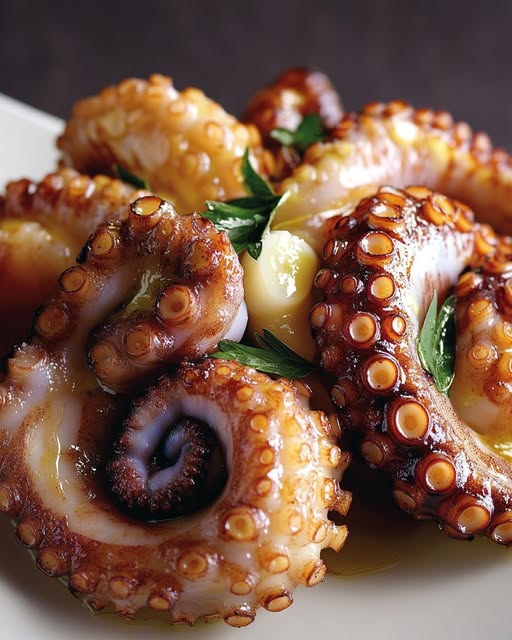A Grilled Octopus Delight That’ll Wow Your Crowd
Picture this: a sun-soaked patio, the sizzle of a grill, and the smell of something truly special wafting through the air. That’s what happened when I first tried my hand at making **Grilled Octopus Delight**. It was for a summer cookout with friends, and let me tell you, it stole the show. This dish is a perfect balance of smoky, tangy, and herby goodness that feels both fancy and approachable. Whether you’re a seafood lover or just looking to impress, this recipe will become your new go-to.
The Story Behind Grilled Octopus Delight
Octopus has been a staple in Mediterranean diets for centuries. In coastal towns across Greece, Spain, and Italy, grilling octopus is an art form passed down through generations. The secret lies in its simplicity—good-quality octopus, a hot grill, and bold flavors. I stumbled upon this recipe while visiting a friend in Greece. Watching her toss tentacles onto a charcoal grill felt like magic. Back home, I tweaked the marinade to suit my taste, adding a splash of vinaigre de vin rouge and fresh herbs from my garden. Now, every time I make it, it feels like a mini vacation on a plate.
Why You’ll Love This Recipe
This **Grilled Octopus Delight** is all about big flavor with minimal effort. The tender, charred tentacles are irresistible, especially when paired with the zesty marinade. Plus, it’s versatile! Serve it as an appetizer, a main course, or even part of a tapas spread. My kids love dipping pieces into tzatziki, and my foodie friends rave about the blend of textures. If you’ve ever been intimidated by cooking octopus, fear not—this recipe makes it foolproof.
Perfect Occasions to Prepare This Dish
Looking to elevate your next dinner party? This dish is perfect for everything from casual backyard barbecues to elegant holiday feasts. Imagine serving it at a seaside-themed gathering or as part of a Mediterranean-inspired menu. It’s also great for date night—a little romance never hurt anyone, right? And don’t forget about Father’s Day or graduation celebrations. Trust me, everyone will be talking about your culinary skills.
Ingredients You’ll Need
- 900 g of cleaned and prepared octopus
- 2 tablespoons of red wine vinegar (adjust to taste)
- 2 tablespoons of fresh lemon juice
- 2 teaspoons of dried oregano (preferably Greek)
- 1 teaspoon of coarse kosher salt (or sea salt)
- ½ teaspoon of freshly ground black pepper
- 6 to 8 tablespoons of extra virgin olive oil
- ¼ cup of finely chopped fresh parsley
- Lemon wedges, for serving
Substitution Options
No octopus on hand? Squid works as a substitute, though the texture will differ slightly. Swap red wine vinegar with apple cider vinegar if needed. Fresh thyme or basil can replace oregano, and lime juice can stand in for lemon. For those avoiding oil, try using a light spray of avocado oil instead of olive oil. Adjust seasonings based on availability and preference—it’s your kitchen, after all!
Step 1: Preparing the Octopus
Start by giving your octopus a good once-over. Most store-bought versions come pre-cleaned, but if yours needs attention, grab a small knife to remove any remaining skin. Cut the body into quarters, leaving the tentacles intact. Rinse them under cold water, pat dry with paper towels, and set aside. Pro tip: drying the octopus thoroughly ensures better caramelization on the grill. As you prep, imagine the ocean breeze—you’re already halfway there!
Step 2: Preheating the Grill
Fire up your grill for direct high-heat cooking. Aim for temperatures around 450°F (230°C). Once it’s blazing hot, lightly oil the grates to prevent sticking. A clean, well-oiled grill is key to achieving those gorgeous grill marks without tearing the delicate flesh. Picture the satisfying sizzle as the octopus hits the metal—it’s music to any cook’s ears.
Step 3: Grilling the Octopus
Place the octopus pieces on the hot grill, turning occasionally with tongs. Each side should take about 3 to 6 minutes, resulting in a total cooking time of 6 to 12 minutes. Look for golden-brown edges and slight charring—it adds depth to the flavor profile. Be patient; rushing this step can lead to uneven cooking. Chef’s tip: Keep an eye out for flare-ups and move the pieces around as needed.
Step 4: Cutting and Marinating
Transfer the grilled octopus to a cutting board and slice it into bite-sized morsels. Toss these into a serving bowl. Now comes the fun part: mixing the marinade. Combine red wine vinegar, lemon juice, oregano, salt, pepper, olive oil, and parsley in a small bowl. Whisk until smooth, then pour it over the octopus. Let it sit for at least 5 minutes—or up to half an hour—for maximum flavor infusion. Serve warm or at room temperature with lemon wedges on the side.
Timing Breakdown
Prep time takes about 10 minutes, while grilling clocks in at roughly 12 minutes. Add another 5 to 30 minutes for marinating. Total time ranges from 27 to 52 minutes, depending on how long you let the flavors meld. Quick enough for a weeknight yet impressive enough for a weekend feast.
Chef’s Secret
To keep the octopus extra tender, simmer it in salted water for 30 minutes before grilling. This step mimics traditional methods and guarantees melt-in-your-mouth results. Trust me, it’s worth the extra effort.
Extra Info
Did you know that octopuses have three hearts? Two pump blood to the gills, while the third pumps it to the rest of the body. How cool is that? Just think about it next time you’re marveling at your perfectly grilled tentacles.
Necessary Equipment
You’ll need a sharp knife, a grill (charcoal or gas), tongs, a whisk, a small mixing bowl, and a cutting board. Simple tools for a simply delicious dish.
Storage Tips
If you have leftovers (unlikely!), store them in an airtight container in the fridge for up to two days. Reheat gently in a skillet to revive the flavors. Avoid microwaving, as it can make the octopus rubbery. Cold leftovers work beautifully in salads or grain bowls too.
For longer storage, freeze the cooked octopus in a freezer-safe bag. Thaw overnight in the fridge before reheating. Note that freezing may alter the texture slightly, so it’s best reserved for soups or stews.
Always label containers with dates to track freshness. Proper storage keeps your Grilled Octopus Delight tasting amazing, no matter when you enjoy it.
Tips and Advice
Use fresh, high-quality ingredients—they truly make a difference. Don’t skimp on the olive oil; opt for a robust variety that complements the dish. And remember, less is more when seasoning. Let the natural sweetness of the octopus shine through.
Presentation Ideas
- Serve on a wooden platter for rustic charm.
- Garnish with extra parsley and lemon zest for color.
- Arrange slices neatly in a circular pattern.
- Add edible flowers for a pop of elegance.
Healthier Alternatives
Here are six ways to lighten up your Grilled Octopus Delight:
- Low-Sodium Option: Reduce the salt and use low-sodium broth during pre-cooking.
- Vegan Twist: Replace octopus with grilled mushrooms or eggplant.
- Gluten-Free Marinade: Ensure all components are gluten-free—most already are!
- Oil-Free Version: Skip the olive oil and rely on citrus for moisture.
- Herbaceous Boost: Double the parsley and add mint for brightness.
- Spicy Kick: Add crushed red pepper flakes to the marinade.
Mistake 1: Overcooking the Octopus
Overcooked octopus turns tough and chewy, ruining the experience. To avoid this, monitor the grill closely and aim for just-charred exteriors. Pro tip: Use a meat thermometer to check internal temps, aiming for 140°F (60°C).
Mistake 2: Skipping the Marinade Rest
Rushing the marination process means missing out on deep flavors. Always allow at least 5 minutes for the marinade to penetrate. Patience pays off here.
Mistake 3: Neglecting Grill Prep
A dirty grill equals stuck food. Clean and oil your grates beforehand to ensure easy flipping and beautiful presentation.
FAQ
What does grilled octopus taste like?
Grilled octopus offers a unique combination of smoky, savory, and slightly sweet flavors. Its texture is tender yet firm, making it incredibly satisfying to eat.
Can I use frozen octopus?
Absolutely! Frozen octopus often benefits from being partially thawed before cooking, which helps retain moisture.
How do I know when octopus is done?
Look for golden-brown grill marks and opaque flesh. The tentacles should feel firm but still yield slightly to pressure.
Is octopus healthy?
Yes, it’s rich in protein, vitamins, and minerals while being low in fat. Just watch portion sizes if you’re monitoring calorie intake.
Where can I buy octopus?
Check local fish markets, specialty grocery stores, or online seafood retailers. Fresh or frozen options both work well.
Can I make this indoors?
Of course! Use a stovetop grill pan or broiler to mimic outdoor grilling conditions.
What pairs well with grilled octopus?
Serve it alongside crusty bread, roasted vegetables, or a crisp green salad for a complete meal.
Does octopus smell fishy?
Fresh octopus shouldn’t have a strong odor. If it smells overly “fishy,” it might not be fresh—choose another piece.
Can I grill baby octopus?
Yes, baby octopus cooks faster and requires less prep. Simply toss whole onto the grill.
What if I don’t like oregano?
Feel free to swap it with thyme, rosemary, or basil for a different flavor profile.
Wrapping It Up
There you have it—a foolproof guide to creating a show-stopping **Grilled Octopus Delight**. With its vibrant flavors and impressive presentation, this dish is sure to become a favorite. So fire up that grill, gather your loved ones, and let the magic happen. Bon appétit!

Grilled Octopus Delight
Ingredients
Equipment
Method
- Give your octopus a good once-over and cut the body into quarters, leaving the tentacles intact.
- Rinse the octopus under cold water, pat dry with paper towels, and set aside.
- Fire up your grill for direct high-heat cooking, aiming for temperatures around 450°F (230°C).
- Lightly oil the grates to prevent sticking.
- Place the octopus pieces on the hot grill, turning occasionally with tongs for 6 to 12 minutes until golden-brown and charred.
- Transfer the grilled octopus to a cutting board and slice it into bite-sized morsels.
- In a small bowl, whisk together red wine vinegar, lemon juice, oregano, salt, pepper, olive oil, and parsley.
- Pour the marinade over the octopus, let it sit for at least 5 minutes, and serve warm or at room temperature with lemon wedges.
